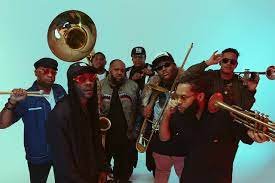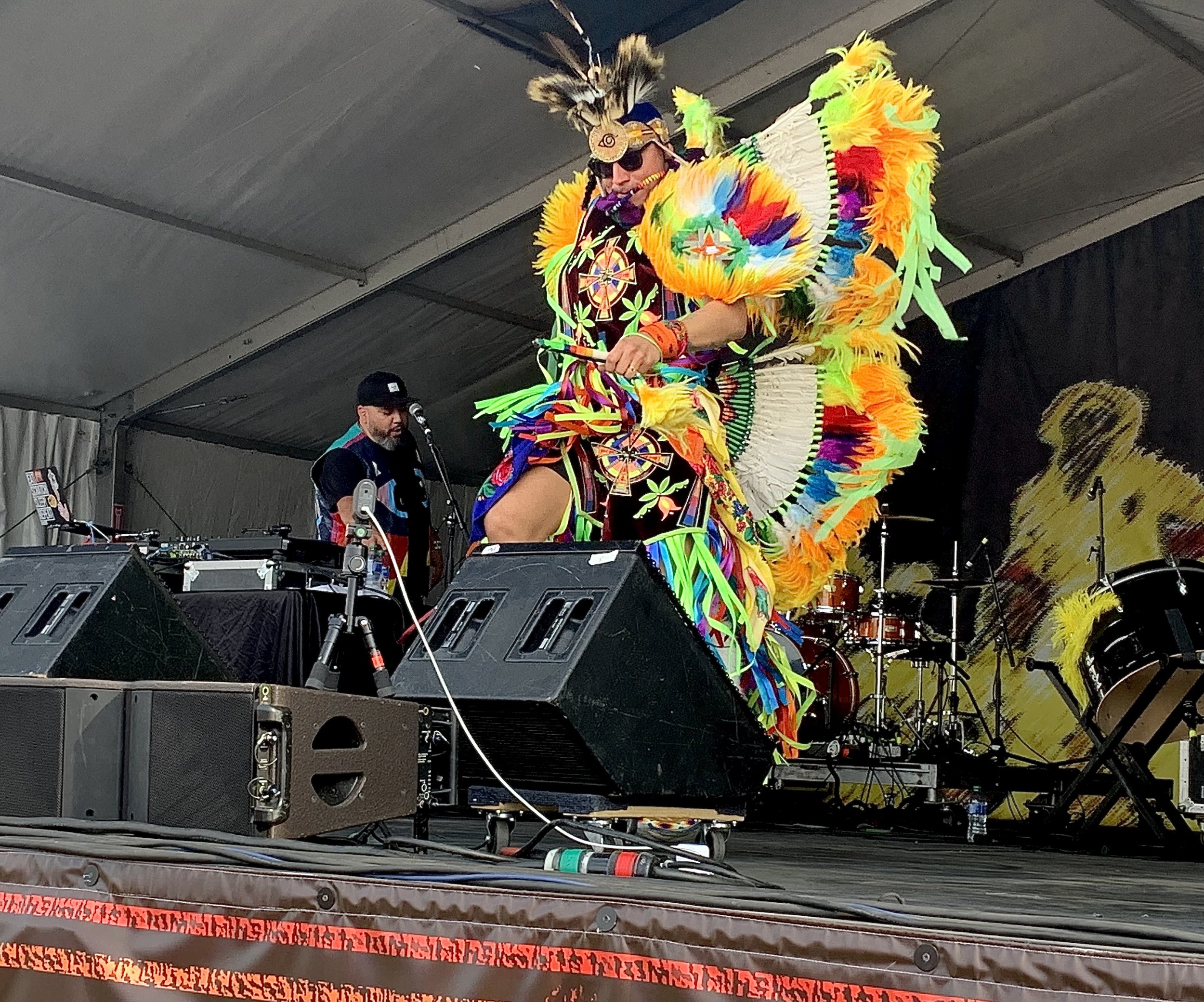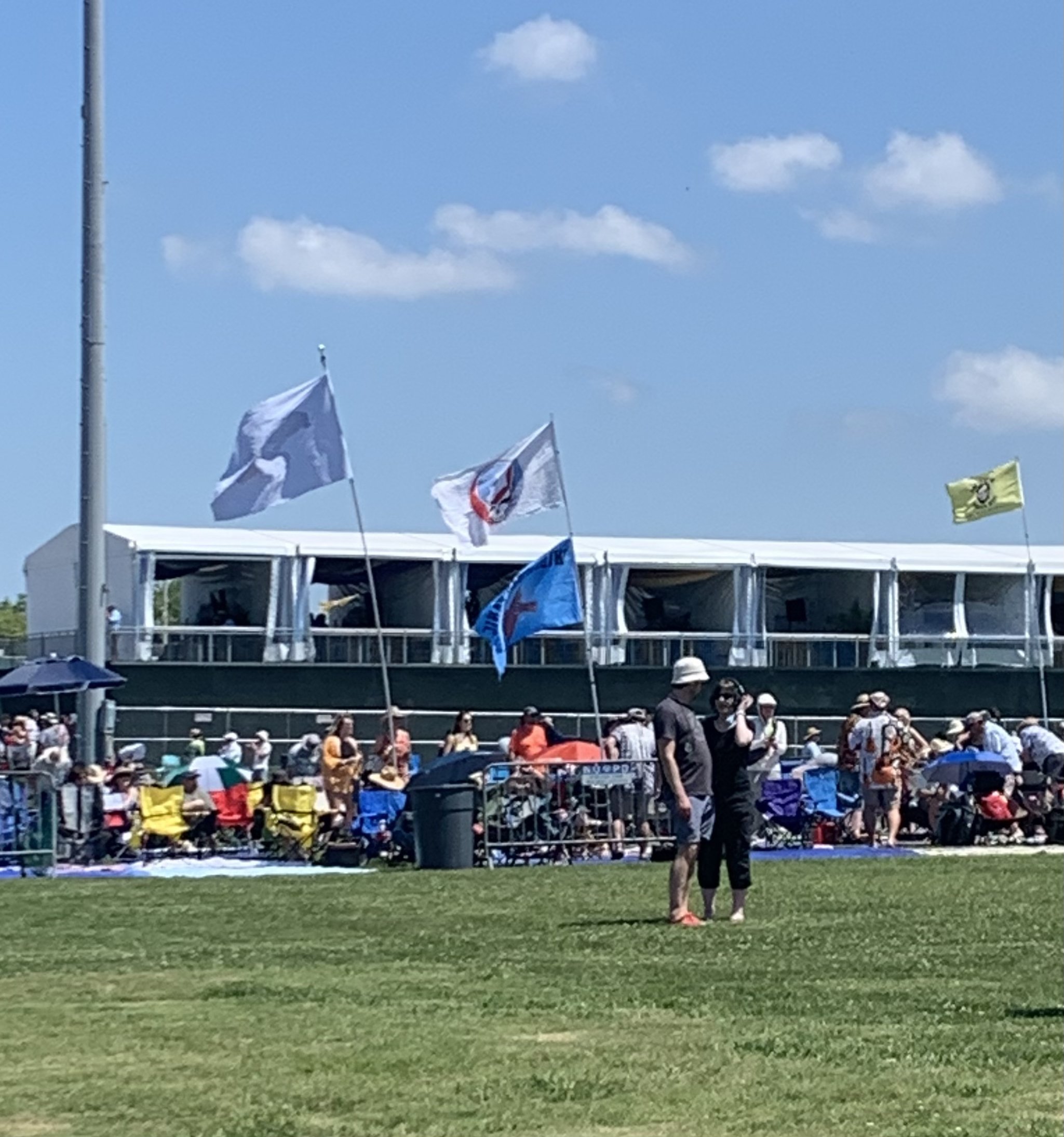Jazz Fest Review Soul Rebels Win Locals Thursday

The brass band was one of the highlights of a laidback day at Jazz Fest.
[Updated] Yesterday was as nice a day as we could ask for at the Fair Grounds, and Jazz Fest responded with a nice day. Not a great day. I bumped into a solid stretch of meh in the middle of the day where little stuck, but the comfortable crowd sizes meant you could still walk straight up to almost any food booth you wanted including the cochon de lait and get what you wanted. I took advantage of that and knocked down the quail and pheasant gumbo (which had larger than usual chunks of meat, not that I’m complaining) and the shrimp and duck pasta (good, but I’m still put off my mulched duck).
The high point? The Soul Rebels’ set on the Congo Square Stage, which was powerful. Songs drifted into each other like an old school funk show, where the groove more than the songs was the star. They lit the crowd up almost immediately with back to back covers of The Eurythmics’ “Sweet Dreams (Are Made of This)” and The Romantics’ “Talking in Your Sleep,” but the band’s identity was clear was as quickly. The set was covers-heavy, but people were responding to what the band was doing with Jay-Z and Daft Punk (the latter with a hot guest spot from Big Freedia); the covers gave The Soul Rebels a platform to show what they can do.
Still, their own songs factored meaningfully into the show. A couple of their songs seemed to stretch out, and “504” still connects powerfully with local and sympathetic fans. The set was as joyous as anything I saw in the first weekend and set a high bar for the second.
Also on Thursday:
- I’m not sure what’s crazier - that Yvette Landry has a son old enough to be her drummer, or that he can swing like he does? During her set of honky tonk classics and originals, Trevor Landry maintained that essential swing without drawing attention from the marquee players on the show. More showily impressive was pedal steel guitarist Richard Comeaux, who took a couple of particularly showy solos because he could, but equally pleasing is that the firepower never overshadowed Landry. Her ability to commit to the story she’s singing with the right intensity made songs and thoughts we’ve heard for ages sound like the real people’s stories that inspired many of them.
- The Wailers were really good, but the question on everybody’s mind was, How many original members are left? The answer is one - Aston “Family Man” Barrett on bass, which made the show feel like a very good Bob Marley cover band.
- Rapper Truth Universal and E.F. Cuttin augmented their voice and turntables lineup with Luther Kent of Bamboula 2000 on percussion, as well as a vocalist and bassist. The bigger sound helped on the Congo Square Stage, particularly when some songs could use a little push. Last year’s Invent the Future is his most sonically rich album, so songs from it sounded great, but Truth has often reminded me of BDP in his musical austerity, speaking his mind with no more music than absolutely necessary. The added musical muscle paid off.
- Truth was also part of a moment I never thought I’d see: rapping in the Allison Miner Music Heritage Stage. He performed during his interview set and sounded great, but hip-hop has made slow, slow inroads at Jazz Fest and it helped that it sounded good.
The other set I didn’t expect was the return of A Tribe Called Red, this time scaled down to the Jazz and Heritage Stage. I can’t imagine dubstep would have appeared at the Fair Grounds if it wasn’t performed by a First Nations group, and it certainly wouldn’t be back under other circumstances. The smaller stage created a better vibe for those dancing to them - last year, the lawn for their set on the Acura Stage was conspicuously empty, and the set wasn’t generic EDM. Samples of tribal drums, chants and cries turned up in their mix, and a dancer came on stage periodically to perform with rings. Those were fun, but his best trick was going into the crowd, getting people to form a circle and dance in it, then slip out while it kept going and return to the stage for the end of the set.
For a review of Lyle Lovett and more on Yvette Landry, see my coverage in The New Orleans Advocate. There's more on The Soul Rebels in the print edition.
Updated May 4 at 10:40 a.m.
The spelling of Aston Barrett's name has been corrected, as has his instrument.






